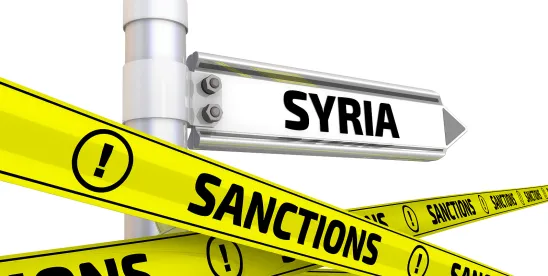The U.S. Department of Commerce’s Bureau of Industry and Security (“BIS”) published a final rule on August 28, easing export controls for Syria (the “BIS Rule”) under the Export Administration Regulations (“EAR”). Effective September 2, the BIS Rule generally permits exports to Syria of EAR99 items without a license, while creating a favorable licensing policy for exports of other items and broadening the availability of certain license exceptions. Items listed on the Commerce Control List (“CCL”) remain subject to an export licensing requirement unless an exception applies, although they may be eligible for the favorable licensing policy described herein.
The BIS Rule follows earlier action by the U.S. Department of Treasury’s Office of Foreign Assets Control (“OFAC”) to terminate the Syrian Sanctions Regulations (the “SSR”) and remove them from the Code of Federal Regulations (“CFR”), while leaving in place sanctions targeted at remnants of the ousted Assad regime and certain other destabilizing regional actors designated on OFAC’s List of Specially Designated Nationals and Blocked Persons (“SDN List”).
Background
For more than two decades, Syria was subject to comprehensive export controls that prohibited the export and reexport of all items controlled under the EAR, including items generally subject to the lowest level of export control (i.e., classified as “EAR99”), except food and medicine.
On May 13, 2025, following discussions with Saudi Crown Prince Mohammed bin Salman and Turkish President Recep Tayyip Erdoğan, President Trump announced his intent to remove all U.S. sanctions on Syria. Soon after, on May 23, the U.S. Department of Treasury issued General License 25 (“GL 25”) under the SSR, suspending most restrictions.
The following month, President Trump issued Executive Order ("EO") 14312, which terminated most sanctions against Syria while leaving in place sanctions against remnants of the ousted Assad regime and its supporters, as well as terrorist organizations and other malign actors.
The recent actions by BIS and OFAC round out full implementation of EO 14312.
License Exception Syria Peace and Prosperity (“SPP”)
The BIS Rule creates License Exception SPP, which authorizes the export and reexport of all EAR99 items to Syria, subject to standard end-use and end-user restrictions under Part 744 of the EAR.
While all EAR99 items now are eligible for license-free export and reexport to Syria under this license exception, all items listed on the CCL remain subject to an export licensing requirement for Syria, unless an exception applies.
Favorable Licensing Policy for Exports in Support of the Development of Syria
The BIS Rule establishes a presumption of licensing approval for exports and reexports to Syria of CCL-listed items in support of:
commercial end uses that support economic and business development in Syria or that support the Syrian people, including through the improvement or maintenance of telecommunications, water supply and sanitation, power generation, aviation, or other civil services that support peace and prosperity in Syria without making a significant contribution to the military potential of Syria or the ability of Syria to support acts of international terrorism.
Other exports and reexports of CCL-listed items are subject to case-by-case licensing consideration, a very significant change from the policy of denial that existed prior to the issuance of the BIS Rule.
Expanded License Exception Availability
The BIS Rule expands license exception availability under the EAR to authorize the following exports and reexports to Syria:
- Temporary Imports, Exports, Reexports, and Transfers (“TMP”):
- The BIS Rule expands License Exception TMP to allow for the temporary export, reexport, and transfer of certain technology, containers, news-gathering commodities, and personal protective equipment.
- In addition, U.S. person exporters may utilize License Exception TMP to temporarily export “components, parts, tools, accessories, or test equipment . . . to a subsidiary, affiliate, or facility owned or controlled by the U.S. person,” subject to certain conditions.
- License Exception Servicing and Replacement of Parts and Equipment (“RPL”):
- Following the revisions to the EAR, exporters and reexporters may rely on License Exception RPL to facilitate the shipment of the “one-for-one replacement of parts, components, accessories, and attachments” so long as the exports are not “destined to Syrian police, military, or intelligence end users or end uses.”
- Notably, because Syria is designated on the EAR in Country Group E:1, exporters and exporters may not utilize License Exception RPL to transmit “replacement parts, components, accessories, or attachments . . . if the commodity to be repaired is an ‘aircraft’” or subject to national security (“NS”) controls.
- License Exception Governments, International Organizations, and International Inspections Under the Chemical Weapons Convention, and the International Space Station (“GOV”):
- Under the revised regulations and subject to certain conditions, U.S.-origin items may now be exported, reexported, or transferred to Syria for use by U.S. government personnel and agencies, agencies of “cooperating governments”, and the North Atlantic Treaty Organization (“NATO”).[1]
- In addition, persons may export or reexport items to the Organization for the Prohibition of Chemical Weapons (“OPCW”) “for official international inspection and verification for use under the terms of the [Chemical Weapons] Convention.”
- License Exception Technology and Software – Unrestricted (“TSU”):
- The BIS Rule expands License Exception TSU to allow export, reexport, and transfer of “copies of technology previously authorized to the same recipient.”
- Persons may also export, reexport, or transfer revised copies of previously authorized technology to the same recipient, subject to certain licensing conditions.
- License Exception Aircraft, Vessels, and Spacecraft (“AVS”):
- BIS expanded License Exception AVS to allow for the temporary export of U.S.-registered civilian aircraft and vessels.
- In addition, the revised license exception authorizes the export of “equipment and spare parts for permanent use on a vessel or aircraft” so long as the exported items are designated as EAR99 or subject to only anti-terrorism (“AT”) controls on the CCL.
- Critically, exporters and reexporters may not utilize License Exception AVS to facilitate transactions that “support the Syrian police, military, or intelligence end users or end uses.”
- License Exception Consumer Communication Devices (“CCD”):
- Exporters and reexporters may rely on License Exception CCD to export eligible consumer communications commodities and software to end-users in Syria.
- This includes, among other things, certain consumer computers, mobile phones, monitors, consumer disk drives, and memory devices.
OFAC Termination of the SSR
On August 26, OFAC terminated the SSR and removed them from CFR, formally ending the longstanding Syria sanctions program. While the SSR were in effect, U.S. persons were prohibited from exporting services to Syria, investing in Syria, and dealing with Syria’s government. All of those transactions now are permissible, so long as no sanctioned persons are involved and the transaction otherwise is compliant with the EAR and other aspects of U.S. law.
Notably, OFAC maintains the Promoting Accountability for Assad and Regional Stabilization Sanctions program, which is targeted at Assad regime remnants, “human rights abusers, Captagon drug traffickers, and certain other destabilizing regional actors.” Additionally, all sanctions authorities targeting Syrian persons for involvement in terrorism, support for Russia’s war effort, support for Iran and its proxies, and involvement in Syria’s past weapons proliferation activities remain in effect.
Key Takeaways
- The BIS Rule completes the Trump Administration’s export control and sanctions relief for Syria as announced by President Trump in May 2025 and as set out in EO 14312.
- The authorization for EAR99 items under License Exception SPP, the favorable licensing policy for economic development of Syria, and the expanded license exception availability noted above—along with OFAC’s termination of the SSR— could be a powerful combination that spurs extensive commercial activity with Syria.
- Notably, Syria is still in BIS Country Group E:1 and remains designated by the U.S. Department of State as a State Sponsor of Terrorism and a “proscribed” destination under Section 126.1 of the International Traffic in Arms Regulations. These restrictive conditions will continue to limit EAR license exception availability for Syria except as noted above, subject CCL-listed items to export licensing requirements for Syria (subject to the licensing policies noted above), and prohibit all exports of defense articles to Syria.
- Overall, the BIS Rule and OFAC’s termination of the SSR are a watershed moment for U.S.-Syria relations and could open a path to significant trade with Syria.
Footnotes
[1] The EAR defines “cooperating governments” to include Argentina, Australia, Austria, Belgium, Bulgaria, Canada, Croatia, the Czech Republic, Denmark, Estonia, Finland, France, Germany, Greece, Hungary, Iceland, India, Ireland, Italy, Japan, Latvia, Lithuania, Luxembourg, Mexico, the Netherlands, New Zealand, Norway, Poland, Portugal, Romania, Slovakia, Slovenia, South Africa, South Korea, Spain, Sweden, Switzerland, Türkiye, and the United Kingdom.




 />i
/>i

